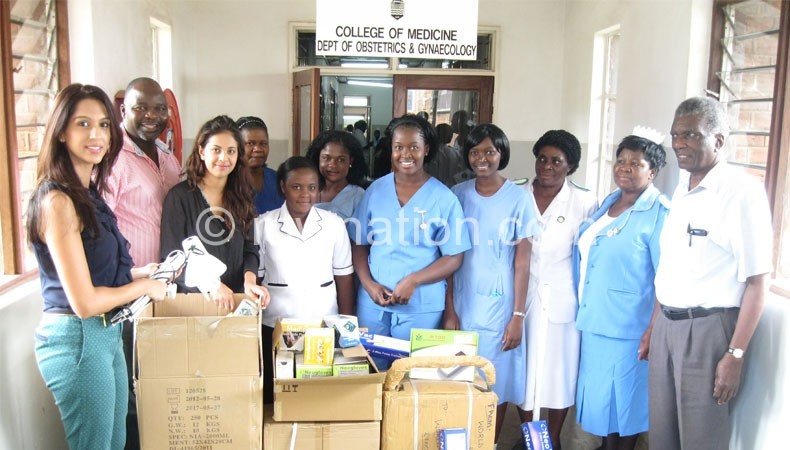Are donations sustainable in financing health sector?
Donors and well-wishers have for decades been financing approximately 60 percent of Malawi’s healthcare system, according to data available on malawiproject.org.
The information shows that donors source equipment, medical supplies and medicines, and ship them to Malawi.

The World Health Organisation (WHO) states that total expenditure on health per capita is just $50 (about K35 555), and expenditure on health as a percentage of gross domestic product (GDP) is only 6.2 percent.
WHO says with very little funding, investigations are limited by resources, and diagnosis is largely based on clinical presentation.
Most laboratory, imaging, and testing facilities are often only available at the major district hospitals.
“Malawi has very few doctors (only one for every 88 300 people in Malawi), so hospitals are staffed by clinical officers (trained for a minimum of four years, and who are very experienced practitioners), and Medical Assistants (trained for a minimum of three years),” says the organisation.
The organisation cites Nkhata Bay as one of the district badly challenged by these problems.
WHO states that the ratio of population to doctors is significantly worse than the national average with just one doctor in the district to 99 542 people, and one registered nurse to every 18 098 people.
“There are only three laboratory technicians, two pharmacy technicians, and one radiography technician for the entire district,” it says.
The 2016 survey by the White Ribbon Alliance for Safe Motherhood (WRASM) paints even a darker picture on Malawi’s health system.
The survey was conducted in public, non-governmental organisations (NGOs) and privately-owned health facilities nationwide, taking a head count of bedside midwives in Malawi defined as those who spend at least 75 percent of their professional time on maternal and neonatal service provision.
The results were expected to inform policy decisions and advocacy, according to WRASM national coordinator Nancy Kamwendo.
A preliminary report in our possession indicates that Malawi has a critical shortage of midwives, forcing one midwife to attend to 10 times more patients than is recommended in the WHO ratio of 175:1.
Says the report: “Additionally, working conditions for midwives in Malawi are not generally motivating. Midwives work long hours and more hours over normal working hours.
“Very few, though, claim allowances for over time. Among the incentives available, risk allowance is comparably commonly provided as financial incentive and participation in management is a commonly provided non-financial incentive.”
WRASM stresses in the report that most midwives only derive job satisfaction from saving lives, being part of solutions to maternal and neonatal health, having a sense of independence in executing their jobs and effecting the connection of theory and practice.
“The setbacks include workload, a lack of appreciation by superiors and a lack of necessary equipment to aid their job,” it says.
It is such revelations that sent tongues of officials from National Initiative and Civic Education (Nice) Trust and WRASM together with community and political leaders wagging recently.
WRASM and NICE are in partnership to raise community awareness on midwifery to influence a raised status and recognition for midwives by government; midwives to provide Respectful Maternity Care (RMC) services, and assisted communities to raise their voices to demand RMC.
And when they met last Tuesday to follow-up on the sensitisation campaign they held at Chinsapo some two months ago, block leaders, councillors, chiefs, health workers and officials from the two organisations, all had one question: how long should Malawi continue depending on the benevolence of donors and well-wishers to finance our health sector?
Councillor for Chinsapo II Ward Christopher Namakhwa was blunt.
Namakhwa said it is time Malawians gave donors and well-wishers a break by “assuming our rightful responsibilities and committing to finance the sector ourselves”.
“But how? Do you we have the resources? Is this not just wishful thinking?” others interjected.
But Namakhwa seems to have well-thought ideas on the matter. The Democratic Progressive Party (DPP) councillor said communities need to devise a number of measures aimed to mobilise resources for their respective health facilities.
He suggested the introduction of monthly financial contributions and organised community fundraising activities to raise finances towards the procurement of drugs and payment of locum to hard-worked midwives.
Namakhwa even suggested that church and faith-based organisations should start organising special events such as Paper Sundays, special collections and other initiatives in aid of health facilities that are closer to them.
Chinsapo Ward I block leader Jamson Chipojola shared the sentiments, emphasising that donations are not sustainable in the running of hospitals in this age of donor-fatigue.
WRASM national coordinator Nancy Kamwendo welcomed the suggestions, saying they could be a step towards finding the lasting solution to existing gaps in the health sector.
“We really need to find lasting solutions to challenges that are besetting our health system,” echoed Kamwendo.
Namakhwa says he is ready to champion this cause, with Bwaila Hospital to be the first beneficiary of this arrangement.
He has since proposed K100 per family per month to be the starting point. n





